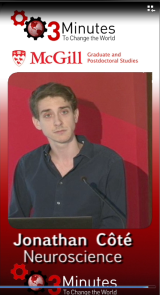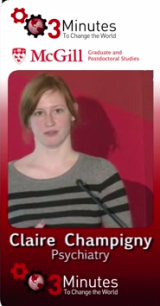McGill hosted its third annual Three Minutes to Change the World, a TED-talk style event, on March 31st, 2014, featuring McGill graduate students giving three-minute presentations about their research initiatives and their impact on the community.

From left to right: Mina Mekhail, Claire Champigny, Joseph Rothstein, Jonathan Cote, Emily Parkinson, Ira Sutherland, Alexandra Blair, Ariane Laferriere, Juan Alarcon, Lauryn Conway, Jay Olsen and Nilmini Mendis
This year, we are pleased to have partnered with the Canadian Association for Graduate Studies (CAGS) and Association francophone pour le savoir (ACFAS) to participate in the first national Three Minute Thesis (3MT) competition. A 3 Minutes to Change the World presenter in English and French were selected from the twelve presenters to represent McGill at the national CAGS 3MT competition and ACFAS concours Ma thèse en 180 secondes (MT180).
Alexandra Blair, a MSc. Psychiatry student, was selected as the English winner. She presented her thesis on how neighbourhoods affect mental health at the Eastern regionals in Halifax. Blair analyses the social, physical and economic factors affecting the general health of community members and looks at how local infrastructure can be used to improve citizen health.
The French winner was Nilmini Mendis, a PhD candidate in Microbiology, who presented “À la chasse des bactéries cachées: L’histoire de Legionella” at the 82e Congrès de l’Acfas. Mendis is developing a means to track the bacteria responsible for Legionnaires’ disease, which becomes dormant and undetectable at low temperatures, in order to improve water testing facilities and minimize outbreaks.
You can read more about the third edition of 3 Minutes to Change the World and watch the 2014 event featuring the twelve incredible Graduate students showcasing their research to other academics and the general public.
 Jay Olsen
Jay Olsen
Department of Psychiatry
“Using magic to influence choice”
How do magic tricks work in the mind? Graduate student, Jay Olsen studies the psychology of magic. One method that magicians use is called forcing, which occurs when the audience's decisions are influenced without their awareness. For example, in many "pick a card" tricks, the audience feels that they have a free choice of any card, though the magician heavily influences this decision. He studies why forcing works.

Jonathan Côté
Department of Neuroscience
“Entrainement pour renverser la perte d’audition chez les personnes âgées”
En vieillissant, l’habilité à ignorer les sons distracteurs et ambiants se détériore. Jonathan Côté et son laboratoire ont trouvé un entrainement permettant de renverser cette perte chez les rats. Le but de sa thèse est de déterminer si cet entrainement fonctionne chez les humains et, si oui, comment la carte sera modifiée. La progression de la modification de la carte les guidera dans leurs prochaines expériences chez les rats et pourra possiblement découler en un traitement pour les personnes âgées ayant un tel trouble de l’audition.

Emily Parkinson
Department of Family Medicine
“Over-the-phone interpretation:The next generation of language access in healthcare”
Health disparities exist between limited language proficient (LLP) and English/French proficient patients, principally in quality and access to care.
Over-the-phone interpretation (OPI) might provide a feasible solution to overcoming the challenges faced by family physicians serving LLP patients. They will introduce OPI services into three Montreal primary care clinics for three months to evaluate its feasibility as a tool for overcoming language barriers in this context. This will be the first trial and evaluation of OPI in Quebec family medicine outpatient settings. They will assess the value of OPI services, and potential enablers of and barriers to its use from the physicians’ perspective. Results of this study will provide useful guidance for the successful integration of OPI services in primary care services across Canada.

Alexandra Blair
Department of Psychiatry
“How do neighbourhoods affect mental health?”
What if the solution to alleviate depression and anxiety lies not only within the mind and the body, but beyond? What if the solution was around us all along: in the streets of our neighborhoods? Alexandra's research examines what features of neighborhoods have an impact on mental health, and what neighborhood changes can be made to promote positive well-being among urban-dwelling Canadians.The future of mental health promotion may lie at a neighborhood level, but careful planning is required so as not to place already vulnerable residents at greater risk of mental health burden.

Ariane Laferrière
Faculty of Law
“L'Après Rana Plaza: Les droits des femmes dans l'industrie du vêtement au Bangladesh”
Le 24 avril 2013, l’immeuble Rana Plaza situé en banlieue de Dacca, capitale du Bangladesh, s’est effondré. Un total de mille cent vingt-neuf travailleurs y ont perdu la vie. Ces désastres ont provoqué une indignation à l’échelle mondiale quant aux conditions de travail dangereuses des employés de l’industrie du vêtement au Bangladesh. Sa recherche porte sur le problème des droits du travail dans l’industrie d’exportation du vêtement au Bangladesh dans le contexte de l’effondrement du Rana Plaza.
Son objectif principal est d’évaluer le potentiel des réponses juridiques qui ont suivi Rana Plaza au niveau national et international, ainsi que de proposer des moyens pour améliorer les conditions de travail de ces femmes. Son analyse est ainsi principalement fondée sur l’expérience concrète des différents intervenants dans ce secteur, leur histoire et leur opinion, puisque la connaissance expérientielle et la théorie vont de pair.

Nilmini Mendis
Department of Microbiology
“À la chasse des bactéries cachées: L’histoire de Legionella”
Legionellla pneumophila, the causative agent of Legionnaire’s disease, is a potentially life-threatening pneumonia especially for individuals in at-risk groups.
s brand new lab at McGill, Nilmini and her team study Legionella pneumophila and its poorly understood relationship in water with respect to virulence. They hope to study Legionella’s direct interactions with these cells as well as using a macrophage-epithelial cell combination for future infections. The latter will be a better representation of the lung environment that L. pneumophila experiences upon initial infection.

Ira Sutherland
Department of Renewable Resources
“Forests, trade-offs and human sustainability”
Ecosystems sustain you and me, and human populations around the world by providing food, clean water and many other goods and services yet over 60% of Earth’s ecosystems have been degraded (MA 2005). A new research discipline has emerged to examine the benefits that nature provides to people; it’s called the ecosystem services approach. Ira investigates ecosystem services recovery in rainforests at Vancouver Island, following logging. He uses existing government datasets and also fieldwork to statistically model the 240 year recovery trajectories of multiple ecosystem services and contrast recovery across the landscape.

Lauryn Conway
Department of Psychology
“Understanding Cyberbullying: The roles of moral emotions & reasoning”
The current study aims to investigate the role of moral emotions and reasoning in cyberbullying and traditional bullying scenarios. Lauryn's proposed research study is the first to investigate cyberbullying through a moral reasoning theoretical framework that has youth take the perspective of the perpetrator and the bystander. Theoretically, it will provide an empirically based account of how moral emotions and reasoning connect with intentional victimization behaviour in a cyber context, as well as provide empirical evidence for the happy victimizer phenomenon in both cyberbullying and traditional bullying. Practically, the results will benefit parents, teachers, and policy-makers by offering a greater understanding of youth’s online engagement, and inform effective pedagogical approaches aimed at addressing cyberbullying in schools.

Juan Sebastian Rodriguez Alarcon
Faculty of Law
Historically, disability has been understood as the result of the physical or mental impairment an individual might have. The purpose of Juan's research is to develop a theoretical framework that intersects gender and sexuality with disability issues and address these concerns using the Social Model of Disability. His research will draw the argument, why the mental health conditions of LGBTQ people should be analyzed from a disability rights perspective and hence, why reasonable accommodations should be provided with the aim to improve societal awareness and inclusion while also ensuring the provision of individualized and consistent health care to LGBTQ people. The results of this research will provide a better understanding of the problem as well as the promises and limits of the Social Model of Disability.

Claire Champigny
Department of Psychiatry
“Attention training for children with impulse-control disorders”
What causes a child to be easily distracted and unfocused in the classroom? For children with impulse-control disorder, the problem arises due to a lower activation in two key regions of the brain, called the dorsolateral prefrontal cortex and the anterior cingulate cortex.
Claire Champigny's research aims to help children with impulse-control disorder using a therapeutic alternative. The brain training program is a computerized program with cognitive exercises disguised as games. It is designed to develop the anterior cingulate cortex and the dorsolateral prefrontal cortex. There are promising results both in terms of behavioral and cognitive progress. This work strives to give every child the opportunity to use the full potential of their brain to succeed in school and to succeed later in life.

Joseph Rothstein
Department of Otolaryngology
“Preventing hearing-loss in children with cancer”
Cisplatin and carboplatin are two of the most widely used and successful chemotherapy drugs available. Their use is limited, however, as 60% of children treated with these drugs will lose their hearing. Hearing loss at a young age impairs learning, communication, school performance, social interaction and overall quality of life. Joey Rothstein looks to identify biomarkers to help predict who the susceptible patients are. With these biomarkers in hand, doctors can identify susceptible patients ahead of time, modify their treatment plans, prevent hearing-loss, and allow these extremely effective chemotherapy drugs to do what they do best, save lives.

Mina Mekhail
Department of Biomedical Engineering
“An injectable biomaterial for spinal cord repair”
pinal cord injuries (SCI) are devastating, especially since the highest prevalence of SCI is amongst the young adult population at the prime of their lives. A cure for SCI remains elusive, and there remains an urgent need for therapies that limit neurological losses that take place early after the injury.
During his PhD, Mina developed a novel biomaterial that can be injected into the spinal cord to specifically target OPCs and enhance their differentiation and myelin production. Overall, our results to date are very promising and further development of this biomaterial can eventually lead to a commercially-available therapeutic modality that can limit neurological losses and improve SCI patients’ quality of life.